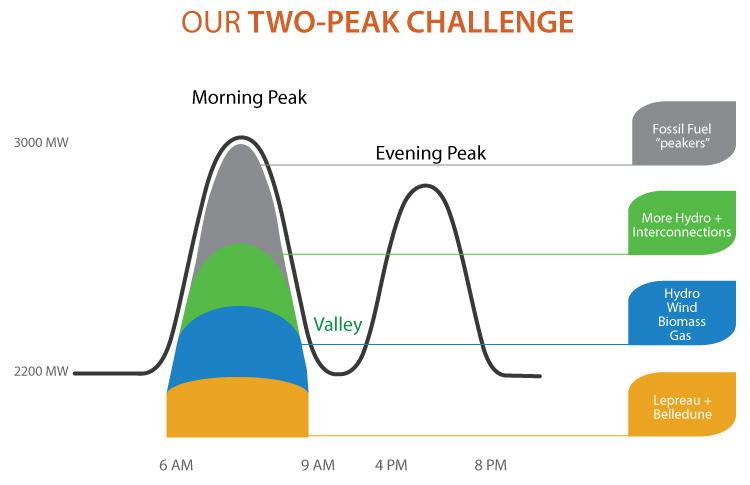What is Peak Demand?
New Brunswick's peak electricity challenge
Every cold winter morning, New Brunswickers wake up, turn up the heat, take hot showers, make breakfast and turn on their appliances, gadgets and devices before heading out for their day.
In the evenings, New Brunswickers return home and run through a similar routine of cooking, running appliances, using hot water, watching television and using our home computers and devices until bedtime.
These daily routines create peaks on the system every weekday between 6 to 9 a.m. and 4 to 8 p.m

This graph is representative of what occurs during peak electricity times in NB. The actual allocations of electricity generation and amounts are dependent upon many factors including weather, demand, availability and market prices and conditions
What is peak demand, anyway?
Peak is the highest one-hour load requirement on NB Power's grid. The lower the temperature, the more electricity we use to stay warm and energize our homes and businesses.
In New Brunswick, many homes are heated with electric heating systems, representing approximately 50% of their total monthly bill.
In the winter, a cold January day might create a peak system demand of 3,000 Megawatts of energy. Compare that to a summer morning when New Brunswickers use only half that and it's easy to see the impact on our system.
So why is peak demand a challenge for New Brunswick?
Our grid is designed to meet New Brunswick's demand for electricity safely and reliably year-round.
Keeping our customers warm and comfortable during the winter is essential, but ensuring we have enough energy in the system to meet these short-term daily electricity peaks means we often have to rely on fossil fuel burning plants and imported energy.
Meeting the peaks costs all of us millions of dollars every year. Our goal is to help customers change their energy habits now so we can avoid investing in expensive power plants in the years to come.
What should I do?
By making little switches in our energy routine, New Brunswickers can spread their need for energy throughout the day and beat the peak without compromising comfort or convenience.
Small changes at home can reduce your monthly bill and reduce the load on our system at peak times. Working together, we can adopt smart energy habits and make New Brunswick greener and more energy efficient. And you can stop paying for electricity you don't need.
There are easy ways to save electricity in winter without compromising comfort, especially during periods of high demand morning between 6-9 a.m. and evenings between 4-8 p.m.
Here are a few examples of what you can do:
- Lower the temperature in unoccupied rooms: you'll save electricity and money
- Put off running your appliances (dryer, dishwasher) by a few hours
- Turn off lights and appliances when you're sleeping or away from home
- Vacuum your electric baseboard heaters to ensure they run efficiently and to reduce the dust in your air
- Take a shorter shower
How will beating the peak help me?
New Brunswick faces peak electricity issues during the very cold morning during the winter months. This means that NB Power must rely on fossil fuel generation to meet the demand or buy the electricity on the open market at higher rates. If New Brunswickers change their habits slightly we could avoid the peak demand and mitigate the need for new generation infrastructure. We also avoid strain on our system, minimize our environmental footprint by reducing emissions and help keep rates low and stable for New Brunswickers.
Why use less electricity when NB Power often has a surplus?
We do have surplus energy to meet New Brunswickers needs. But surpluses are rare in winter, so NB Power must rely on fossil fuel generation or buy expensive power from neighbouring systems – just to meet peak demand.
Energy exchanges between NB Power and its neighbouring systems are common practices. In turn, neighbouring U.S. systems can rely on our power deliveries to meet their summer peak consumption needs.
I don't want to give up any comforts at home. How do I benefit from using less electricity?
Saving electricity doesn't mean you have to sacrifice any comfort or convenience. There are many small things you can do that can have a big impact for the overall electricity usage in New Brunswick. For example, turning off the lights when you leave a room, use a power switch bar for electric appliances such as your TV and radio, and hanging your laundry on a drying rack. By knowing the little tricks, you save electricity and avoid paying for energy you don't need. And the result could be a lower bill.
I've been making changes, but don't see a major difference in my bill. Why's that?
Your electricity consumption includes many different factors: the weather, the number of people in your household, your home's characteristics and the appliances you use. To increase your energy savings, check out the kilowatt usage of electric appliances before your purchase them.
I can't afford to buy new appliances or heating equipment. How am I supposed to do anything?
Saving energy doesn't have to be expensive. There are easy ways you can reduce and shift your energy usage: lowering your thermostat, turning off the lights when you leave a room or hanging your laundry on a drying rack are only a few examples to save electricity.









